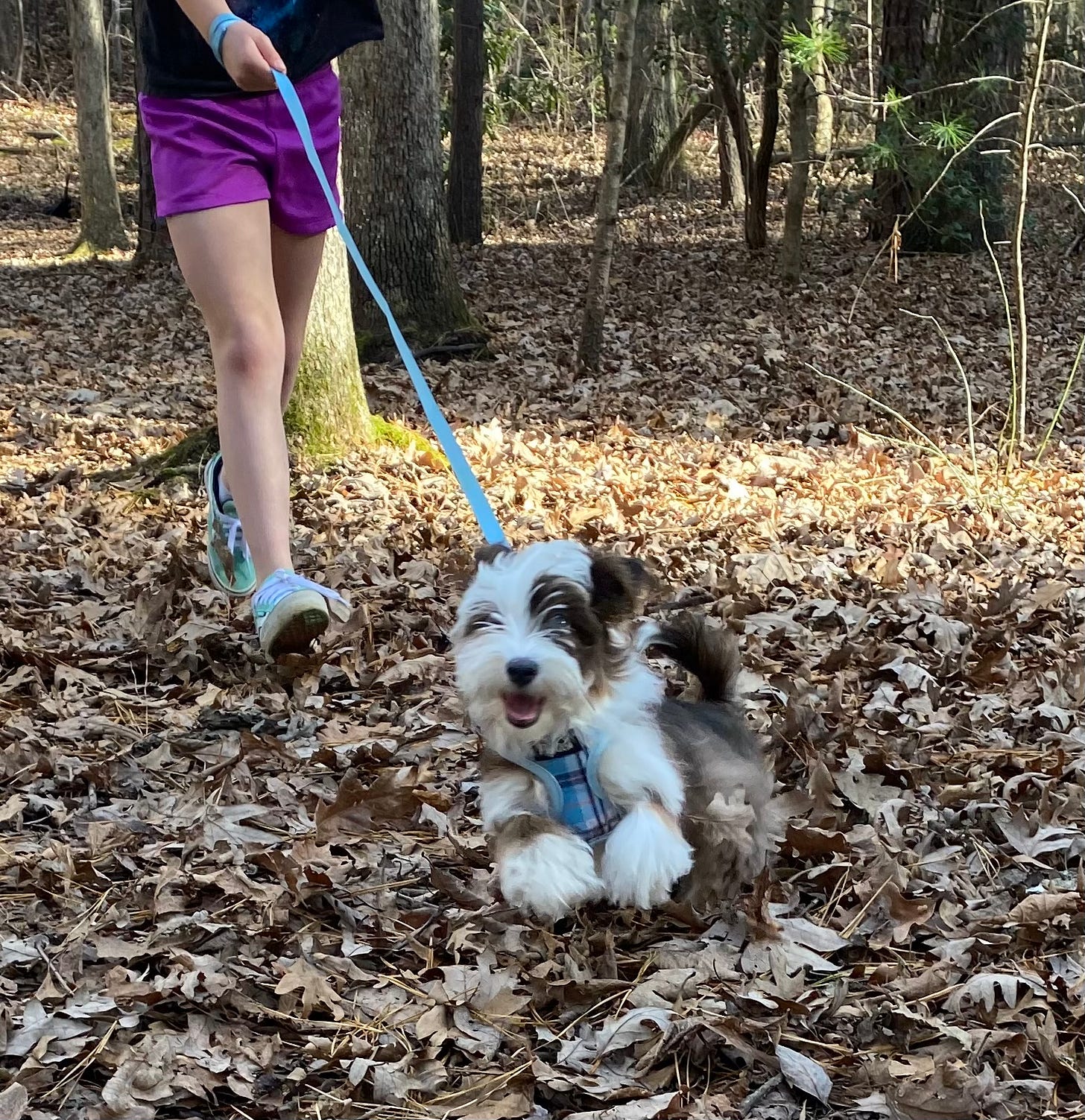Use Your Manners, Y'all
What basic etiquette, Reese Witherspoon, and my dog can teach us about managing our artistic rights.
I’m back!
For the last few months, I’ve been fascinated by custom-based solutions for copyright and trademark problems. Some scholars refer to these extralegal options as “self-help” strategies and look down their august noses at the “vigilantes” who employ them.
They’re not wrong - some self-help approaches are mean, coarse, rude, and unhelpful. Others - like the kind we use at my law firm - can be elegant, gracious, and collaborative.
My grandmother would ask why this is unusual. Somewhere in heaven, Lenora Mae Alligood Griffin is shaking her salon-coiffed head and saying, “Sounds like you’re just using your manners.”
She’s right; I’m just doing as taught by my extensive Southern family. I grew up in New York City, but I also grew up in this book:

I was raised in a big, mean city by a devoted single mother who had to make a lot of silk purses out of a few sow’s ears. She taught me that good manners are a passport to any destination. If you have good manners, people will be glad to include you, and you will always have lots of happy chances. Her advice has never failed me; my good manners gave me access to many opportunities we couldn’t otherwise afford.
I understand that this brand of white, Southern femininity may seem inaccessible to many and off-putting to some. As Sonia Chopra has pointed out, manners are great, but blind adherence to tradition and custom has inured many Southerners to systemic inequalities and entrenched racist, sexist, and classist norms.
And yet, as Nora Mae would say: don’t throw the baby out with the bathwater.
I don’t go in for pearls and monograms, but geniality, grace, respect, generosity - count me in! In my experience, basic manners take very little effort but make all the difference in my professional negotiations. I’m an intellectual property expert, but half the time, I think it’s my command of etiquette that wins the day.
We’re going to return to copying and copyright, but first, let’s talk about DOGS. I had an experience this weekend that turned out to be a helpful allegory.
Last Sunday, my partner and I took our dog (Emily) for a walk. We have lived on a bucolic cul-de-sac for a year, yet still don’t know all of our neighbors.
Across the street, two of these neighbors were applying an ambiguous chemical treatment to their lawn. As usual, they didn’t respond when we waved, so we assumed they didn’t notice us.
Until the woman ran into the street, yanked her mask down, and hollered:
“Excuse me, can you STOP letting your dogs pee on MY bushes? ALL the dogs NEED to STOP peeing on MY plants and KILLING them. I’ve had to change them out a few times over the years. It’s costing me lots of money. AND THAT’S NOT FAIR!!!”
How do you respond to a stranger suddenly caterwauling at you in the street on a pastoral Sunday morning?
We could be lawyers about it and explain that the bushes probably aren’t planted on her property, but the city-owned “kerb.” (Hence “curb your dog.”)
We could be high-and-mighty about it and say, “Any seasoned gardener could tell you this is an irrigation issue, not a dog peeing problem. 50% of the Home Depot bushes you are planting must be expected to die, you’ve chosen a spot with too much direct sun for those variants, and your cheap mulch is a haven for disease. Unless you invest in a sprinkler system, these plants will never grow beyond a foot in height.”
We could blame her and say, “Put up a No Peeing sign and let dog owners know you’re struggling to grow bushes.”
As I was contemplating my response, my partner smoothly replied: “We’re not responsible for all dogs, but we’ll be sure our dog doesn’t pee here.” (He’s great with a comeback.)
As we rushed away, I whispered: “Wouldn’t that have felt different if she introduced herself first?”
5 minutes later, I had an opportunity to test my theory with another neighbor.
A man’s voice yelled, “WINNNSTONNN, come back!” 100 lbs. of unleashed English bulldog came flying at us, breaching the border of his unfenced front lawn and tearing down a public street.
This happens at least once a week. I usually spin haughtily on my heel and walk off, my neighbor’s cries of “He’s friennnnnndly!” falling away in the distance.
This time, while my partner picked up 10-lb. Emily, I walked confidently towards our neighbor, my hand outstretched and ready to shake. “Hi, I’m Katherine. We live down this street.”
The man babbled, “I’m Stanley. This is Winston. He’s a good boy. He comes when I call. He doesn’t come when my wife calls.”
Winston has never once come when Stanley called him, either. Would pointing that out be helpful? I doubt it.
“Yes,” I said brightly, scratching Winston’s ears while he drooled on my shoe. “He’s a very good boy. Can I give him a treat?”
“Uh, yeah,” Stanley said. “He really is sweet. He runs at people but would never hurt anyone. He’s just a big baby.”
In sunshine tones, I replied: “Yes, he’s darling. Our dog, Emily, has had terrible experiences with off-leash dogs. We’re working with a trainer, but she’s still skittish. Would you mind if introduced them?”
I’d like to tell you they’re best doggie friends now, but Emily suffers no fools, and she’s had enough of this goofy monster. My tiny Havanese walked up to the huge Bulldog that’s been chasing her for a year and punched him in the nose.
“Oops!” I cried. “Emily, be polite!”
While we chatted amiably about the weather and landscaping, Emily guarded me and Winston hid behind Stanley’s legs. We parted ways with a friendly wave.
What happened here? Why was this better? How does any of this relate to negotiating a licensing agreement?
Our first, nameless neighbor saw us as a problem - and continues to see us as a problem. After our hostile engagement, I don’t know her any better, I feel no sympathy for her garden problems, and I’m not interested in encountering her again, much less helping her! She probably still sees me as a Selfish Dog Owner; I now see her as Someone to be Avoided. It takes a lot of energy to care about others; I tend to reserve my energy for people who don’t yell at me.
By contrast, Stanley now sees me as a person. We used each other’s names. We took responsibility for our parts in the dog drama, I think in part because when we saw each other, we also saw ourselves. My neighbor was gently, indirectly reminded that he needs a leash or a fence. I was reminded to set Emily up with some play therapy. Going forward, we can graciously navigate any remaining gray space as “Katherine” and “Stanley,” neighbors and dog lovers who have common interests and common goals.
Why? I think it is because humans are ruled by self-interest and, all too often, our unexamined feelings. As a lawyer, I think about my clients’ feelings, but I also think about the counterparties’ feelings, too.
When you get a cease-and-desist letter or DMCA takedown notice on law firm letterhead, it feels like you’re being yelled at in the street, doesn’t it? Now, there is a time and space for yelling. When someone is stealing wood from or peeing in my yard (#ashevillelife), you best bet I’ll raise my voice. If a powerful party that knows better copies my client’s work, they get a full-throated response. The book is called Whiskey in a Teacup, and I only look like a porcelain doll.
Otherwise, my firm takes the position that this is all a big misunderstanding; someone just needs to be tapped on the shoulder, and maybe we can even make a friend!
Not because it’s “nicer” or more “pleasant” to be polite. Not because I cleave to traditional notions of femininity.
We take this approach because it WORKS.
When one of our clients’ work is copied on social media, we ghostwrite a pleasant DM for them. The client then sends it to the offender from their own account. In my experience, a polite and informal process doesn’t always work with a giant corporation, but it always works when dealing with an individual.
Most recently, it took less than 15 minutes to come to a resolution. We didn’t even charge our client.
Is this even lawyering? As a lawyer, I don’t know. Honestly, I can’t be bothered - my days are spent getting my clients’ needs met. So, as long as my methods aren’t illegal or unethical, I give little thought to when I’m “being a lawyer” and when I’m “acting right,” as my grandmother would say.
But as an academic, I care to know - understanding how and why gracious and informal approaches work is important. If my inexpensive, efficient methods work for most person-to-person situations, then IP lawyers should use these methods widely to keep clients out of costly and onerous legal entanglements.
This event arrived in my inbox this morning, which suggests that I’m not alone in thinking about the merits of civility.
I’ll be reading widely, thinking deeply, and writing often about sociable self-help strategies this year. I’m curious to know what you think and eager to hear your stories! Please comment below with your personal anecdotes about copying and self-help (particularly if it happened on social media or via a platform like Etsy) AND tell me when formal legal interventions didn’t work or caused the other party to “lawyer up.” Or, as always, you can connect with me at katherine[at]devosdevine.com or on Instagram at @devosdevine.
———
THIS WEEK’S IMPACTFUL INFLUENCES:
Are the Supremes a Rock Band? Noah Berlatsky’s brilliant analysis of Jann Wenner’s racism and misogynism and the outsized impact of his bias on 20th-century music.
Jann Hammer Is Garbage. But Not Because He's a Boomer. More Berlatsky, and with more music!
Ahsoka. Has anyone else noticed how much Seatos looks like the Enchanted Forest from Frozen II? Or that Peridea looks like a take on a Studio Ghibli film? Guess Disney doesn’t have to worry about claims of infringement when it owns ALL the influences!






You know I loved every word. Yes, yes, and yes.
My older brother is an attorney who is hired frequently for his reputation for being a relentless asshole when needed. He ALWAYS advocates polite civility as the first step.
I was SHOCKED when he told me, because he really can be an asshole, and I suppose that stories about getting your client to respectfully approach the other party and come to a peaceful agreement aren't all that interesting.